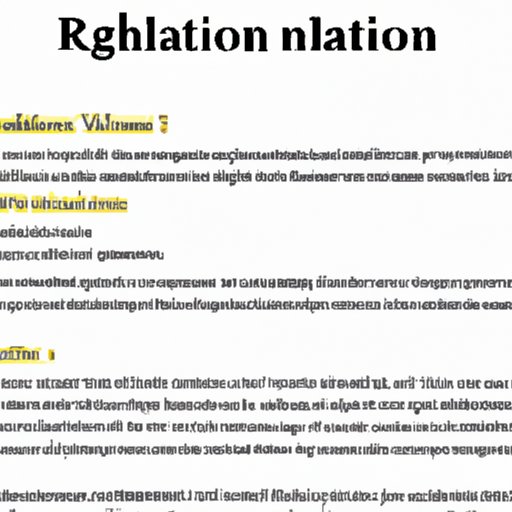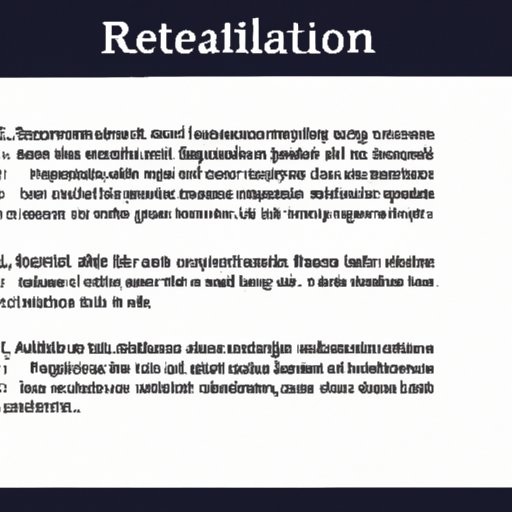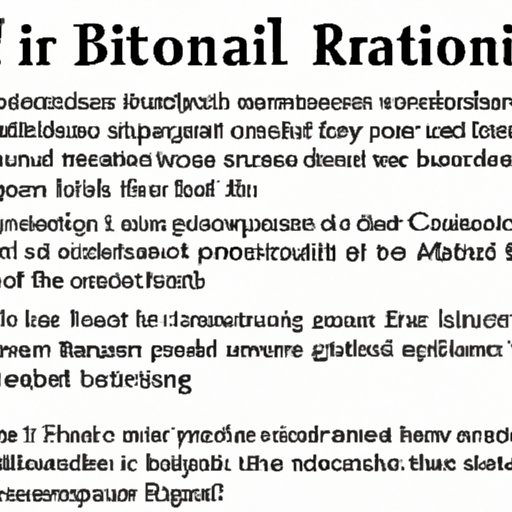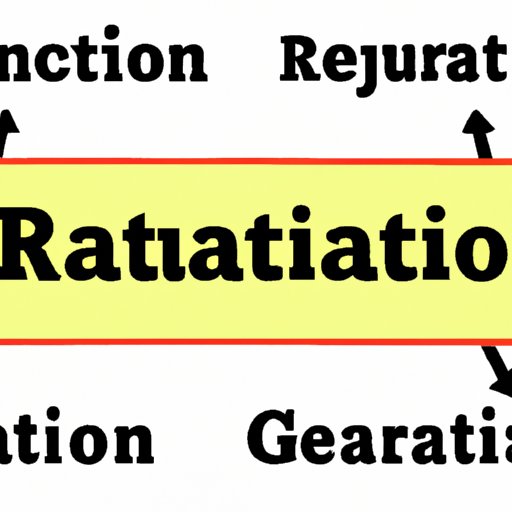Introduction
Rationale is a key component of any written work. But what exactly is a rationale in writing? A rationale is an explanation of why you chose a particular idea or approach to a problem. It is used to support your argument and provide evidence for your claims. Additionally, it serves as a way to explain your thought process and the logic behind your decisions.
In this article, we will explore the role of rationale in writing and how it can help you as a writer. We will also discuss how to incorporate rationale into your writing and provide some examples of rationale in writing. Finally, we will look at the benefits of using rationale in your writing.

A Guide to Understanding Rationale in Writing
Before diving into the specifics of how to use rationale in your writing, let’s start by exploring what rationale is and how it can help you as a writer.
What Is Rationale?
As mentioned before, a rationale is an explanation of why you chose a particular idea or approach to a problem. It is the reasoning behind your decisions and the thought process that led you to choose one approach over another. Rationale is often used in academic papers, business proposals, and other types of written documents to support your argument and provide evidence for your claims.
How Does Rationale Help You as a Writer?
Rationale helps you as a writer by providing a logical structure for your argument. By explaining your thought process and the logic behind your decisions, you can make your argument more coherent and convincing. Additionally, it can help you identify any gaps in your argument and fill them with evidence and facts. Finally, it can help you stay focused on the main points of your argument, rather than getting sidetracked by irrelevant details.
Analyzing the Role of Rationale in Writing
Now that we have an understanding of what rationale is and how it can help you as a writer, let’s take a closer look at the role of rationale in writing.
Types of Rationale
There are several different types of rationale that can be used in writing. The most common type is the traditional rationale, which is an explanation of why you chose a particular approach to a problem. Other types of rationale include ethical rationale, which explains the moral principles behind your decision; economic rationale, which explains the financial considerations behind your decision; and political rationale, which explains the political or social implications of your decision.
Benefits of Using Rationale
Using rationale in your writing has several benefits. First, it can help you make a stronger argument by providing evidence and facts to back up your claims. Second, it can help you stay focused on the main points of your argument. Third, it can help you identify any gaps in your argument and fill them with evidence and facts. Finally, it can help you organize your thoughts and create a logical structure for your argument.
How to Incorporate Rationale into Your Writing
Now that we have a better understanding of the role of rationale in writing, let’s look at how to incorporate rationale into your writing.
Guidelines for Developing Rationale
When developing your rationale, there are several things to keep in mind. First, make sure that your rationale is clear and concise. Avoid long-winded explanations and focus on the main points of your argument. Second, make sure that your rationale is supported by evidence and facts. Third, make sure that your rationale is logically organized. Finally, make sure that your rationale is relevant to the topic at hand.
Tips for Writing Effective Rationale
In addition to following the guidelines for developing rationale, there are a few other tips for writing effective rationale:
- Start with a strong statement that clearly states your position.
- Explain your thought process and the logic behind your decisions.
- Provide evidence and facts to support your argument.
- Organize your argument in a logical manner.
- Avoid making assumptions or sweeping generalizations.

Examples of Rationale in Writing
To get a better understanding of how to incorporate rationale into your writing, let’s take a look at two examples of rationale in writing.
Example 1: Academic Paper
In this example, the author is writing an academic paper on the importance of physical education in schools. In the paper, they provide a rationale for why physical education should be a mandatory part of the curriculum:
“Physical education is an important part of the school curriculum because it promotes physical fitness and overall health. Studies have shown that students who participate in regular physical activity perform better academically and have improved cognitive functioning. Additionally, physical education classes can teach students valuable lessons about teamwork and cooperation, which can help them succeed in other areas of their lives.”
Example 2: Business Proposal
In this example, the author is writing a business proposal for a new product. In the proposal, they provide a rationale for why their product is the best option for the company:
“Our product is the best option for your company because it offers a number of advantages over competing products. Our product is more affordable, easier to use, and more reliable than other options. Additionally, our product is backed by a team of experienced professionals who are available to provide support and assistance whenever needed. Finally, our product is designed with scalability in mind, so you can easily expand your operations as your business grows.”

Benefits of Using Rationale in Writing
Finally, let’s take a look at the benefits of using rationale in your writing.
Improved Argumentation
One of the main benefits of using rationale in your writing is that it can help you make a stronger argument. By providing evidence and facts to back up your claims, you can make your argument more convincing and compelling.
Increased Clarity and Focus
Another benefit of using rationale in your writing is that it can help you stay focused on the main points of your argument. By providing a logical structure for your argument, you can ensure that your argument is clear and focused on the main ideas.
Conclusion
In conclusion, rationale is an important component of any written work. It is an explanation of why you chose a particular idea or approach to a problem and can help you make a stronger argument. There are several different types of rationale that can be used in writing, and incorporating rationale into your writing can have several benefits, such as improved argumentation and increased clarity and focus. By following the guidelines for developing rationale and using the tips for writing effective rationale, you can successfully incorporate rationale into your writing.
Rationale can be a powerful tool in any writer’s arsenal. With a little practice, you’ll be able to use it effectively to make your arguments more convincing and compelling.
Summary of Key Points
In this article, we explored what rationale is and how it can help you as a writer. We discussed the types of rationale and the benefits of using rationale in your writing. We also looked at how to incorporate rationale into your writing and provided some examples of rationale in writing. Finally, we discussed the benefits of using rationale in your writing.
Final Thoughts
Rationale is a key component of any written work and can be a powerful tool in any writer’s arsenal. By understanding the role of rationale in writing and incorporating it into your writing, you can make your arguments more convincing and compelling.
(Note: Is this article not meeting your expectations? Do you have knowledge or insights to share? Unlock new opportunities and expand your reach by joining our authors team. Click Registration to join us and share your expertise with our readers.)
